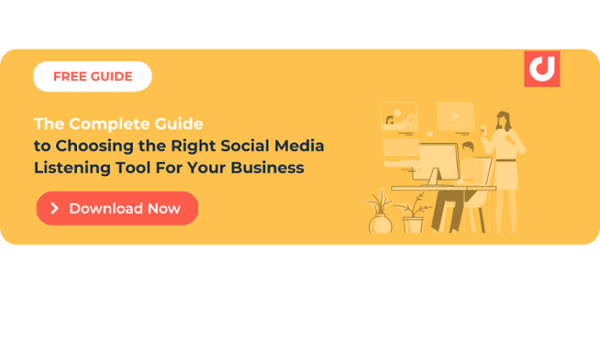Top 10 Competitive Intelligence Tools 2022
What is Competitive Intelligence?
Organizational performance can be improved through the use of competitive intelligence, which involves developing knowledge about the competitive environment through forward-looking practices. An organization’s business strategies are created based on the analysis of data and information collected from various sources. Whether it’s information expressed online about a competitor’s latest products from consumers or current viral trends gaining immense traction, using a strategic competitor analysis is critical for any brand or business seeking to stand out in the market.
For your organization to thrive in today's fast-paced competitive environment, it's important to understand the competition and the opportunities and challenges it presents. However, if your competitor analysis is executed incorrectly, competitive intelligence gained from your analysis can be overlooked and overwhelming.
A competitive intelligence tool can come in handy for any manager within an organization to achieve the goals you set, help your marketing strategies, and more. Selecting the proper tool to gain competitive intelligence can be overwhelming with the numerous options you have to select from. Here is a list of the top 10 competitive intelligence tools in 2022 to help you conduct a competitor analysis.
1. SEMRush Traffic Analytics
SEMRush is an all-in-one tool suite that helps you increase your online visibility and gain marketing insights. Its primary features are keyword research and online ranking data (search volume, cost-per-click, etc.). Traffic analytics are available on the SEO platform to help with your competitor analysis. Your competitor’s PPC and SMM campaigns can be analyzed, resulting in data that can be turned into actionable insights for your business.
2. Crunchbase
Powered by live company data, Crunchbase provides intelligent prospecting software for gaining insights into private and public companies. Analyze industry trends and upcoming players in the market with real-time data by identifying innovative companies with their dynamic tools and detailed insights. Researching and keeping tabs on the latest trends within your sector will help you with your competitive analysis.
3. Klue
This competitor analysis tool enables departments across all industries to gain competitive market intelligence providing insight into the competitive environment. By viewing the data across the web, Competitive Enablement from Klue simplifies the process of gathering, curating, and delivering information. Your organization will be able to track the real impact of your competitive program and be aware of potential threats.
4. SimilarWeb
Analyze how your competitors acquire customers across all channels using SimilarWeb. With the platform, you can estimate how much traffic is received by different websites based on their traffic estimates. View your competitors’ traffic shares and channel performances across your industry, along with their keyword traffic shares. SimilarWeb provides insights into competitive markets.
5. Digimind
Digimind is a social media monitoring and competitive intelligence platform that provides you with information on companies' competitive standing in the market. The platform allows the user to monitor, visualize, and share internal information and data to support your competitive intelligence efforts throughout your organization. You can measure the economic wealth of the competitors, discover strengths and weaknesses to identify opportunities and threats within the market, knowledge of competitors’ products and services, and more.
6. Moat
Moat is a digital measurement company that uses data and analytics to enhance marketing campaigns. Their cloud-based service measures consumer attention across channels, devices, and platforms. With real-time analytics, you can explore the competition through the search engine to gain insights into its creative digital history like advertisements, press releases, etc. Moat can help your organization's creative team decide what type of content you want to produce to stand out in the competitive environment.
7. Konnecto
Konnecto is a consumer intelligence tool that helps you with your competitor analysis needs. Data from their path-to-purchase optimization platform can be used to explain why consumers choose different competitors. Users can gain direct insights into customer journeys that converted with the competition, understand why they converted, and more.
8. Wappalyzer
A website's technology stack can be found by using Wappalyzer. Beyond discovering which competitors' software is used, you can also compare market shares and technology trends, look at technical data behind competitors' websites, and so on with Wappalyzer’s browser extension. Discover what CMS a competitor's website is using, web frameworks, and e-commerce platforms to get a better understanding of the competitive framework. The platform is extremely useful for conducting a competitor analysis for your organization if you are seeking technical answers.
9. SpyFu
SpyFu is another platform that primarily focuses on keyword research. Any domain can be searched to see every occurrence of its name on Google (from organic rankings to keywords they purchased) for the previous 16 years. Additionally, the user can browse a competitor's complete Google Ads campaign history, helping your team gain insights on what. Using the keyword search feature, you can find competitors' keywords that you don't buy and decide whether you should purchase those keywords.
10. Crayon
The automatic competitive intelligence tracking capabilities of Crayon can help you centralize competitive intelligence. With this tool, you have a real-time snapshot of what your competitors are doing that gives you invaluable insight into key departments within your organization that can be accessed and utilized as needed. Your competitors' digital footprint is tracked by Crayon, including their content, reviews, and news. Users enter a competitor's name, and the platform captures and curates on- and offline information.
Conclusion
Conducting a competitor analysis can often be challenging for someone who is not sure what results they are seeking. Choosing the right competitive intelligence tool for your organization begins with knowing what information you want to gather from your competitor analysis. Any competitive analysis will be successful if the goals and objectives behind it are clearly defined and understood.
Having the knowledge and a deeper understanding of your organization's competitive environment, challenges, and opportunities, your business can utilize the results properly to develop and execute effective marketing strategies. With the various options at your disposal, a competitive intelligence tool is essential for any marketing tool kit and will ultimately help conduct your competitor analysis.


